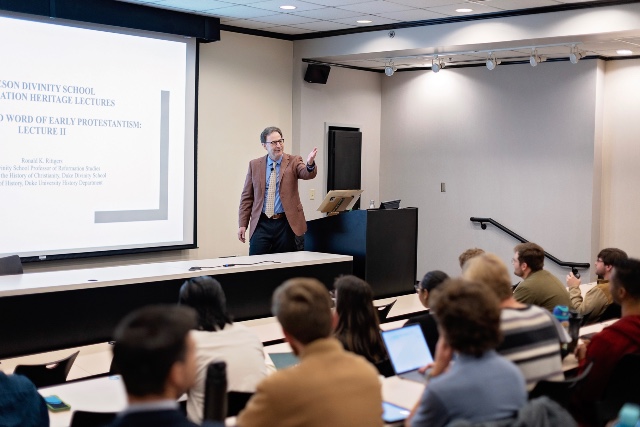
Samford University’s Beeson Divinity School hosted its annual Reformation Heritage Lectures from Oct. 28-30. This year’s lectures were delivered by Ron Rittgers, professor of Reformation studies and history of Christianity at Duke Divinity School.
The week began with Rittgers preaching from Mark 7:31-37, in which Jesus heals a deaf and mute man with His spit. Rittgers called the passage a Reformational one, as it ends with “ears unstopped and tongues unloosed to hear the Gospel.”
The words of Christ are essential to healing in Mark, Rittgers said, but in this passage, healing comes from Christ’s own body, which itself was spat upon.
“The one who heals with holy spit will be spat upon by unholy sinners,” Rittgers said.
Divinity schools and seminaries represent a “holy spit sodality,” Rittgers said.
“It is a fellowship where we all come to receive this holy spit and the holy Word that prepares us for the kingdom work of being spat upon, along with the deep joy of kingdom work,” he said.
Rittgers took his theme for this year’s lectures from his ongoing book project, in which he argues against the thought among some scholars that the Reformation led to a “disenchanted” view of Scripture, a more scientific view of God’s Word that reduced it to a set of doctrines and beliefs, as opposed to an “enchanted” view where God’s Word and the reading of it represents the meeting of heaven and Earth, a holy communion with God and the Word being an object where “the finite is capable of the infinite.”
The Reformers, Rittgers argued, saw Scripture as a “place of encounter, even mystical encounter, with God,” a place where the believer feeds on Christ through His Word by faith. While they opposed Catholic sacraments and sacramentals, they “redirected the flow of divine grace into one might river called Scripture.”
“There was something deeply alluring and attractive about the Word to the early Protestants,” Rittgers said.
Past scholars such as Max Weber argued Protestants tried to “remove the magic from Christianity,” of the “finite bearing infinite,” and worked to suppress the role of senses and emotions in Christian faith and practice.
“Scripture was a source of how you should live and think, an ethically rationalized pattern of life, a codification of divine law and had a dogmatic character to it,” Rittgers said of Weber’s description of the Protestant view of Scripture.
Rittgers used case studies from the Reformation to show that the enchanted Word was the “most important source of divine enchantment” to Protestants, and that it “may well be the most important source of the enduring appeal of Protestant Christianity.”
Protestants should lean into this rich heritage, Rittgers said.
“I want to show than an enchanted Word was part of the original Protestant birthright. It is essential to the Protestant DNA,” Rittgers said. “I want Protestant churches to expect to meet God in Scripture, to feed on Christ by faith in the Word. And I want to offer this birthright as a gift to the rest of Christendom as a gesture of ecumenical generosity, and as a reminder that it is the birthright of all Christians.
“The Triune God wishes to meet all of us, each one of us, in the Word, in precisely the way the Protestant Reformers advocated,” Rittgers said.
Rittgers also spoke at a preaching lunch and learn for Beeson’s Spirit and Power Project. He spoke of the Reformational belief that in preaching, there is a “kerygmatic real presence” of Christ, through the preaching of the Gospel.
The Reformational view of preaching, especially in the teaching of Martin Luther, was to replace the Catholic Mass with a sermon. The emphasis on the preaching of God’s Word is seen in the many church ordinances that were crafted during the Reformation, he said.
“When I think about the weight the Reformers placed on preaching, it makes me shake in my boots when I think about approaching the pulpit,” Rittgers said.
Rittgers also spoke at a PhD seminar.
Recordings of this lecture series will be available online at the Beeson Store, along with past years’ lectures.
